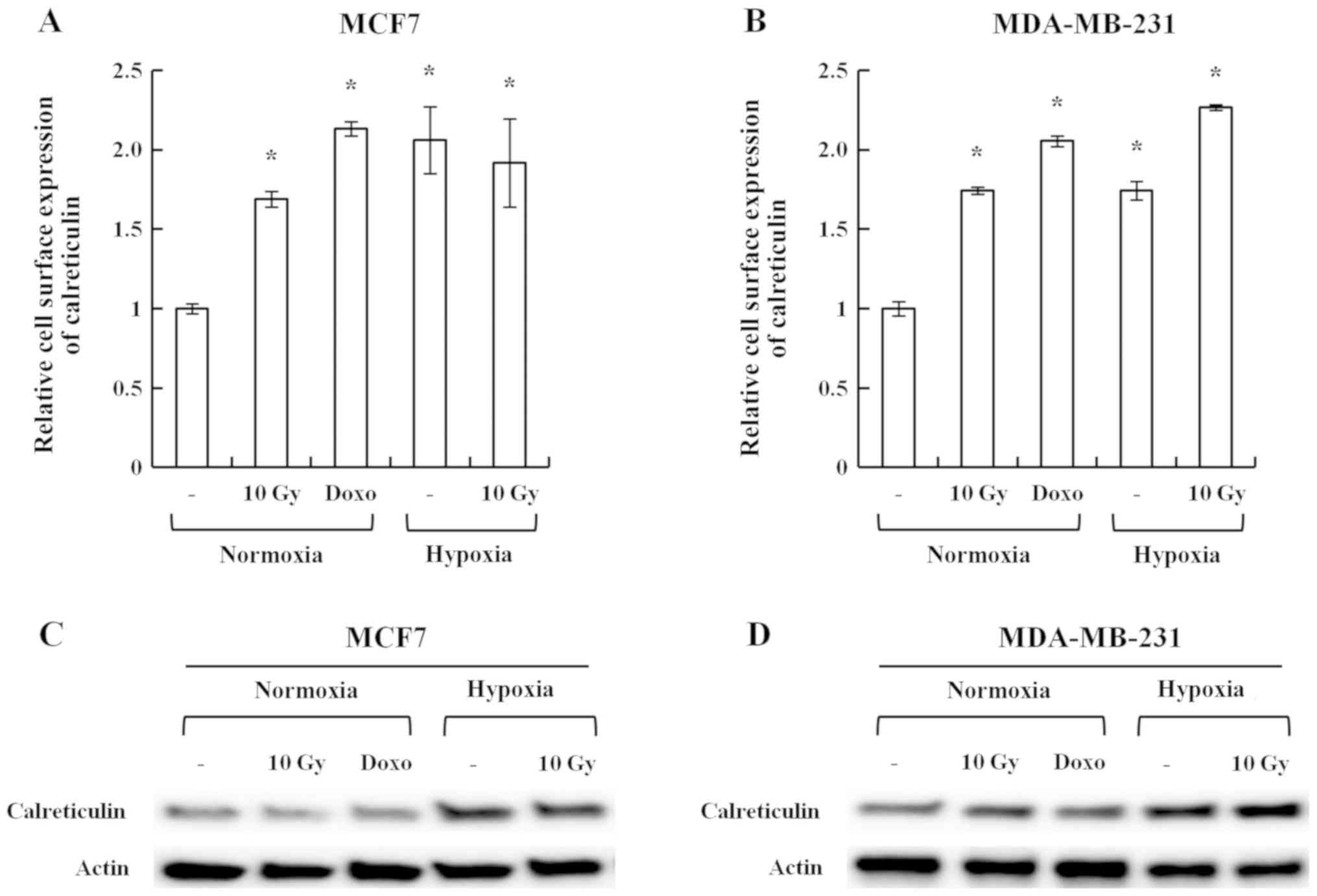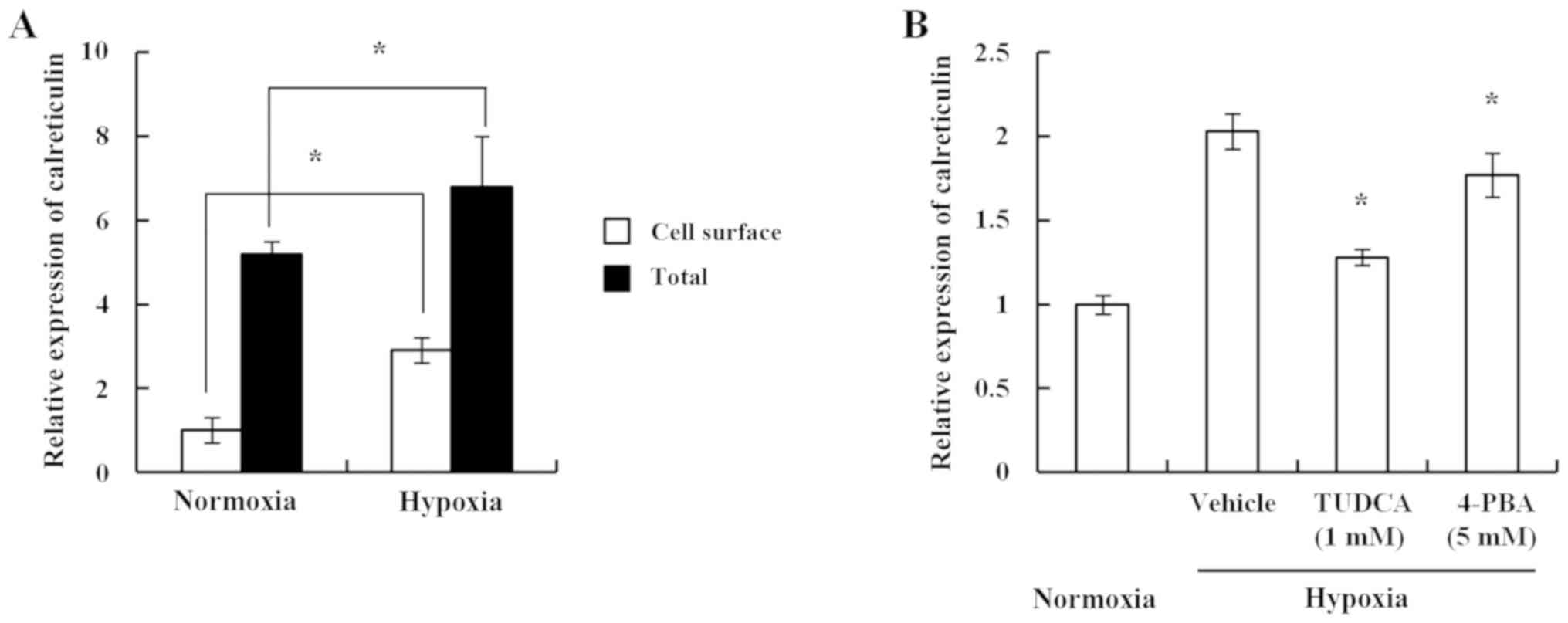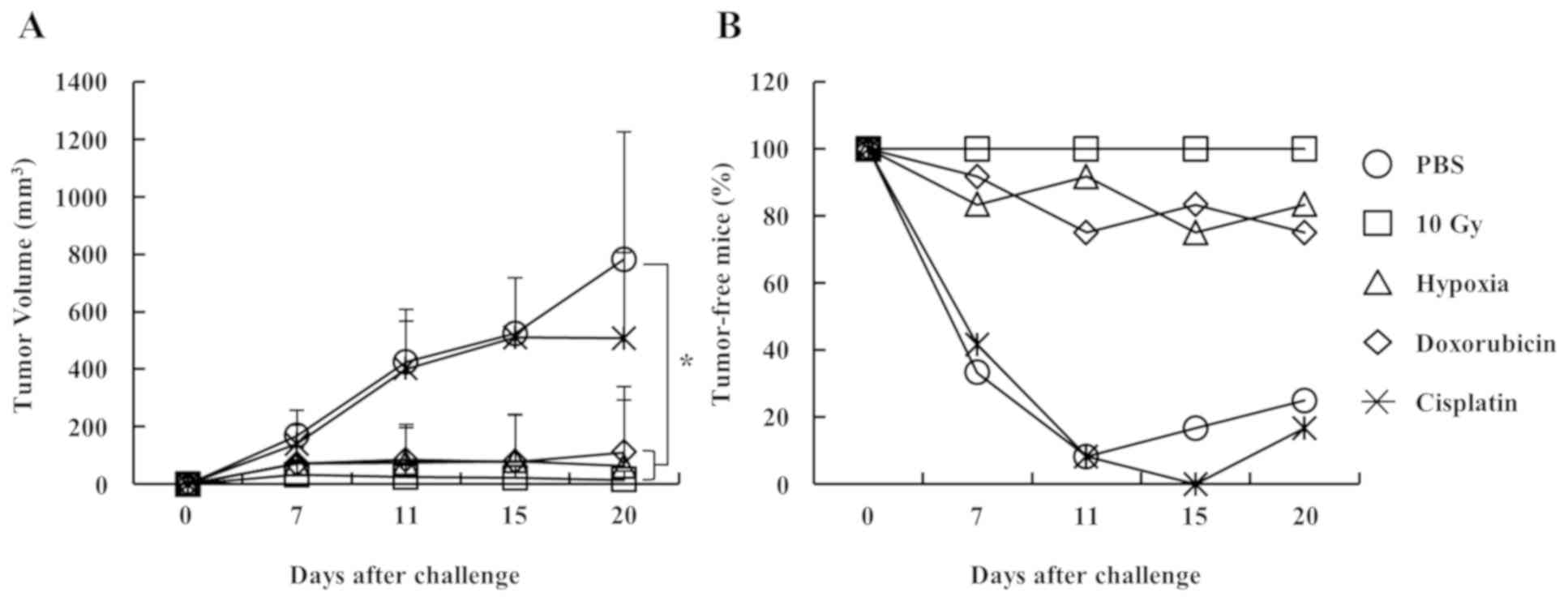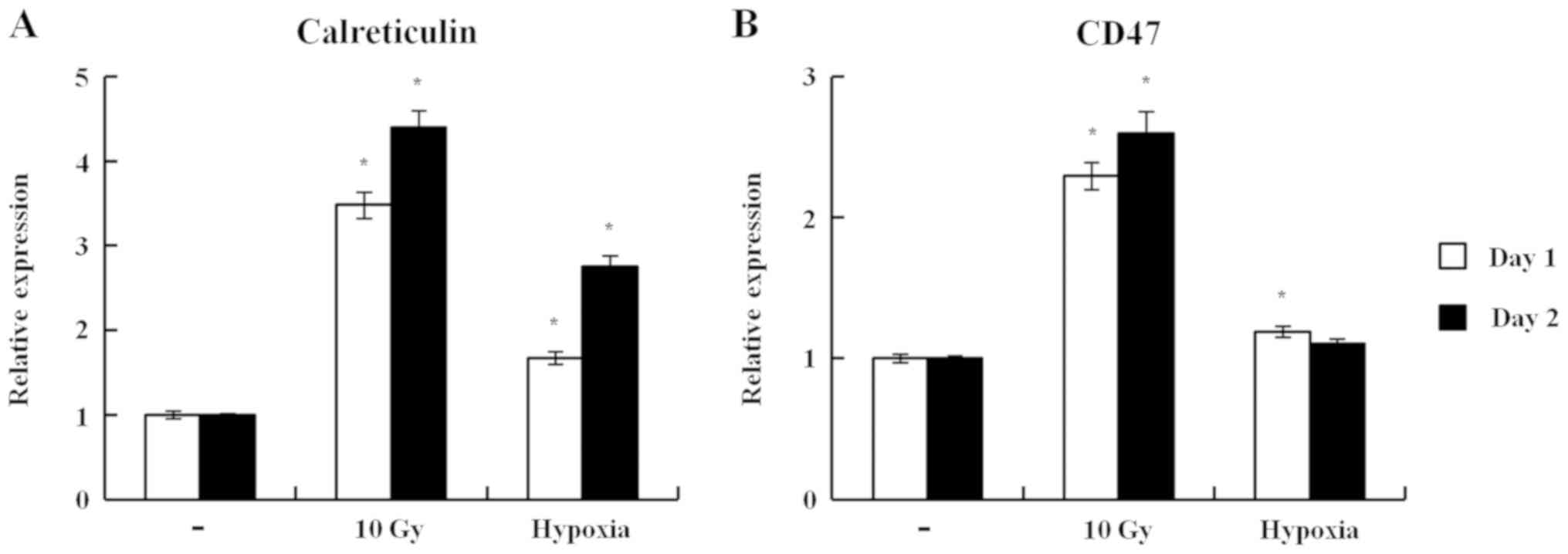|
1
|
Evans SM and Koch CJ: Prognostic
significance of tumor oxygenation in humans. Cancer Lett. 195:1–16.
2003. View Article : Google Scholar : PubMed/NCBI
|
|
2
|
Le QT, Denko NC and Giaccia AJ: Hypoxic
gene expression and metastasis. Cancer Metastasis Rev. 23:293–310.
2004. View Article : Google Scholar : PubMed/NCBI
|
|
3
|
Majmundar AJ, Wong WJ and Simon MC:
Hypoxia-inducible factors and the response to hypoxic stress. Mol
Cell. 40:294–309. 2010. View Article : Google Scholar : PubMed/NCBI
|
|
4
|
Koumenis C and Wouters BG: ‘Translating’
tumor hypoxia: Unfolded protein response (UPR)-dependent and
UPR-independent pathways. Mol Cancer Res. 4:423–436. 2006.
View Article : Google Scholar : PubMed/NCBI
|
|
5
|
Gabrilovich D: Mechanisms and functional
significance of tumour-induced dendritic-cell defects. Nat Rev
Immunol. 4:941–952. 2004. View
Article : Google Scholar : PubMed/NCBI
|
|
6
|
Hao NB, Lü MH, Fan YH, Cao YL, Zhang ZR
and Yang SM: Macrophages in tumor microenvironments and the
progression of tumors. Clin Dev Immunol. 2012:9480982012.
View Article : Google Scholar : PubMed/NCBI
|
|
7
|
Mahadevan NR, Anufreichik V, Rodvold JJ,
Chiu KT, Sepulveda H and Zanetti M: Cell-extrinsic effects of tumor
ER stress imprint myeloid dendritic cells and impair
CD8+ T cell priming. PLoS One. 7:e518452012. View Article : Google Scholar : PubMed/NCBI
|
|
8
|
Zanetti M, Rodvold JJ and Mahadevan NR:
The evolving paradigm of cell-nonautonomous UPR-based regulation of
immunity by cancer cells. Oncogene. 35:269–278. 2016. View Article : Google Scholar : PubMed/NCBI
|
|
9
|
Obeid M, Tesniere A, Ghiringhelli F, Fimia
GM, Apetoh L, Perfettini JL, Castedo M, Mignot G, Panaretakis T,
Casares N, et al: Calreticulin exposure dictates the immunogenicity
of cancer cell death. Nat Med. 13:54–61. 2007. View Article : Google Scholar : PubMed/NCBI
|
|
10
|
Panaretakis T, Kepp O, Brockmeier U,
Tesniere A, Bjorklund AC, Chapman DC, Durchschlag M, Joza N,
Pierron G, van Endert P, et al: Mechanisms of pre-apoptotic
calreticulin exposure in immunogenic cell death. EMBO J.
28:578–590. 2009. View Article : Google Scholar : PubMed/NCBI
|
|
11
|
Lee CG, Park GY, Han YK, Lee JH, Chun SH,
Park HY, Lim KH, Kim EG, Choi YJ, Yang K and Lee CW: Roles of
14-3-3η in mitotic progression and its potential use as a
therapeutic target for cancers. Oncogene. 32:1560–1569. 2013.
View Article : Google Scholar : PubMed/NCBI
|
|
12
|
Park GY, Han JY, Han YK, Kim SD, Kim JS,
Jo WS, Chun SH, Jeong DH, Lee CW, Yang K and Lee CG: 14-3-3 eta
depletion sensitizes glioblastoma cells to irradiation due to
enhanced mitotic cell death. Cancer Gene Ther. 21:158–163. 2014.
View Article : Google Scholar : PubMed/NCBI
|
|
13
|
Aslakson CJ and Miller FR: Selective
events in the metastatic process defined by analysis of the
sequential dissemination of subpopulations of a mouse mammary
tumor. Cancer Res. 52:1399–1405. 1992.PubMed/NCBI
|
|
14
|
Gardai SJ, McPhillips KA, Frasch SC,
Janssen WJ, Starefeldt A, Murphy-Ullrich JE, Bratton DL, Oldenborg
PA, Michalak M and Henson PM: Cell-surface calreticulin initiates
clearance of viable or apoptotic cells through trans-activation of
LRP on the phagocyte. Cell. 123:321–334. 2005. View Article : Google Scholar : PubMed/NCBI
|
|
15
|
Fadok VA, Bratton DL, Guthrie L and Henson
PM: Differential effects of apoptotic versus lysed cells on
macrophage production of cytokines: Role of proteases. J Immunol.
166:6847–6854. 2001. View Article : Google Scholar : PubMed/NCBI
|
|
16
|
Hoffmann PR, Kench JA, Vondracek A, Kruk
E, Daleke DL, Jordan M, Marrack P, Henson PM and Fadok VA:
Interaction between phosphatidylserine and the phosphatidylserine
receptor inhibits immune responses in vivo. J Immunol.
174:1393–1404. 2005. View Article : Google Scholar : PubMed/NCBI
|
|
17
|
Chao MP, Jaiswal S, Weissman-Tsukamoto R,
Alizadeh AA, Gentles AJ, Volkmer J, Weiskopf K, Willingham SB,
Raveh T, Park CY, et al: Calreticulin is the dominant
pro-phagocytic signal on multiple human cancers and is
counterbalanced by CD47. Sci Transl Med. 2:63ra942010. View Article : Google Scholar : PubMed/NCBI
|
|
18
|
Michalak M, Corbett EF, Mesaeli N,
Nakamura K and Opas M: Calreticulin: One protein, one gene, many
functions. Biochem J. 344:281–292. 1999. View Article : Google Scholar : PubMed/NCBI
|
|
19
|
Dedhar S: Novel functions for
calreticulin: Interaction with integrins and modulation of gene
expression? Trends Biochem Sci. 19:269–271. 1994. View Article : Google Scholar : PubMed/NCBI
|
|
20
|
Leung-Hagesteijn CY, Milankov K, Michalak
M, Wilkins J and Dedhar S: Cell attachment to extracellular matrix
substrates is inhibited upon downregulation of expression of
calreticulin, an intracellular integrin alpha-subunit-binding
protein. J Cell Sci. 107:589–600. 1994.PubMed/NCBI
|
|
21
|
Raghavan M, Wijeyesakere SJ, Peters LR and
Del Cid N: Calreticulin in the immune system: Ins and outs. Trends
Immunol. 34:13–21. 2013. View Article : Google Scholar : PubMed/NCBI
|
|
22
|
Porcellini S, Traggiai E, Schenk U,
Ferrera D, Matteoli M, Lanzavecchia A, Michalak M and Grassi F:
Regulation of peripheral T cell activation by calreticulin. J Exp
Med. 203:461–471. 2006. View Article : Google Scholar : PubMed/NCBI
|
|
23
|
Lu YC, Weng WC and Lee H: Functional roles
of calreticulin in cancer biology. Biomed Res Int. 2015:5265242015.
View Article : Google Scholar : PubMed/NCBI
|
|
24
|
Olin MR, Andersen BM, Litterman AJ, Grogan
PT, Sarver AL, Robertson PT, Liang X, Chen W, Parney IF, Hunt MA,
et al: Oxygen is a master regulator of the immunogenicity of
primary human glioma cells. Cancer Res. 71:6583–6589. 2011.
View Article : Google Scholar : PubMed/NCBI
|
|
25
|
Olin MR, Andersen BM, Zellmer DM, Grogan
PT, Popescu FE, Xiong Z, Forster CL, Seiler C, SantaCruz KS, Chen
W, et al: Superior efficacy of tumor cell vaccines grown in
physiologic oxygen. Clin Cancer Res. 16:4800–4808. 2010. View Article : Google Scholar : PubMed/NCBI
|


















